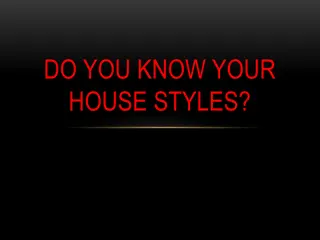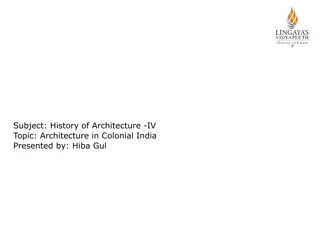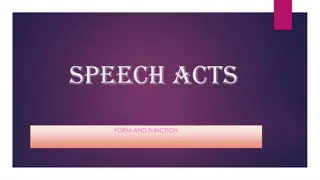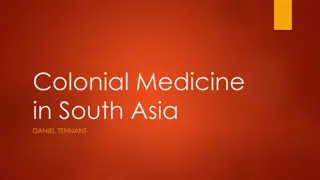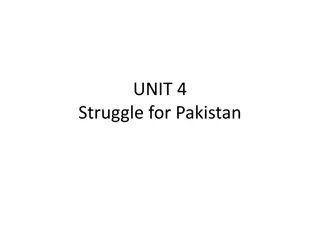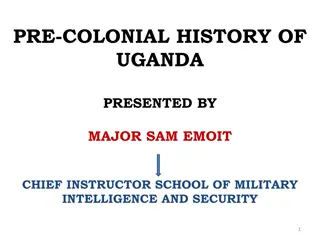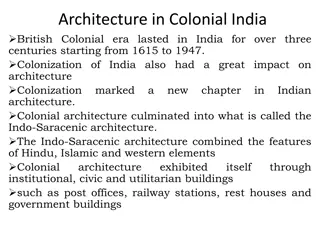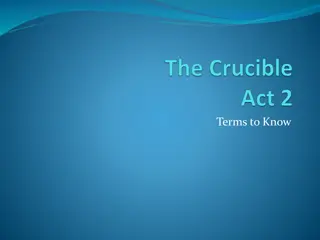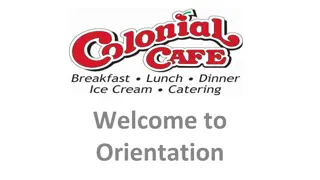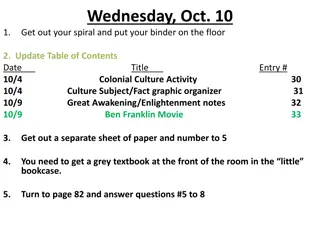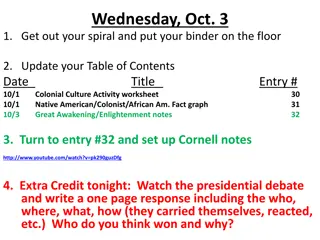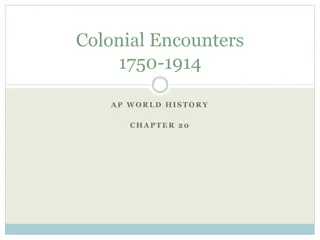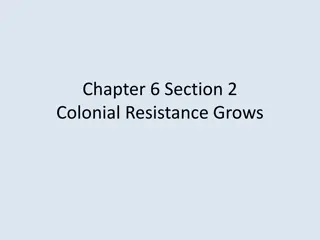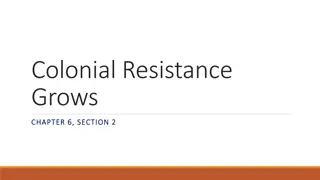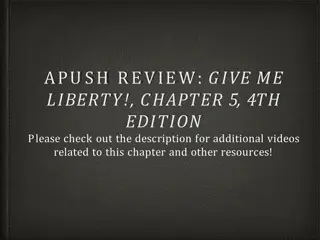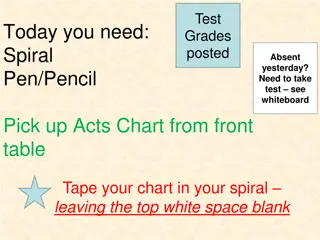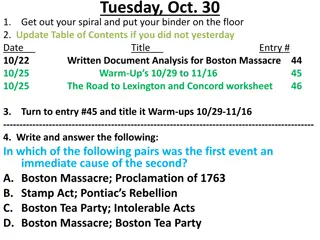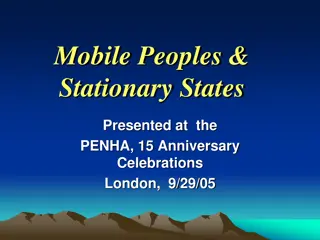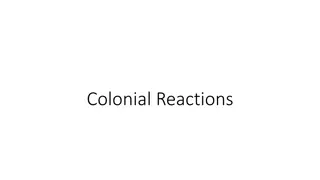Colonial Acts and Conflicts in American History
Key historical events such as the French & Indian War, the Proclamation of 1763, and the Quartering Act are explored, shedding light on critical laws, conflicts, and tensions that shaped colonial America. The discussion covers acts imposed by the British government, the impact on settlers and Native Americans, and colonial resistance against unjust taxation and military enforcement.
Download Presentation

Please find below an Image/Link to download the presentation.
The content on the website is provided AS IS for your information and personal use only. It may not be sold, licensed, or shared on other websites without obtaining consent from the author.If you encounter any issues during the download, it is possible that the publisher has removed the file from their server.
You are allowed to download the files provided on this website for personal or commercial use, subject to the condition that they are used lawfully. All files are the property of their respective owners.
The content on the website is provided AS IS for your information and personal use only. It may not be sold, licensed, or shared on other websites without obtaining consent from the author.
E N D
Presentation Transcript
Terms to Know. Terms to Know . ________ created or passed by a ______________________ Acts _____________ that is _________ to someone else Debts Taxation without Representation forcing people to pay _________ when they have had NO SAY in making the _______ that created the tax to ________________ ________________ about something that people believe is wrong or unfair Protest
10.2 The French & Indian War 10.2 The French & Indian War __________and __________ both claimed the land in the ___________________________. ______________ wanted the land to farm the rich soil. ______________ wanted the land to trap beavers/trade furs. The French & Indian War lasted from 1754- 1763. In this war the French and British (along with many colonists)fought against each other. _________ Native Americans fought with the French _________ Native Americans fought with the English.
10.2 The French & Indian War (cont) 10.2 The French & Indian War (cont ) The BRITISH _______________ called it the French & Indian War Eventually the ______________ won the war. They won control over ______________, and they won the land between the _____________________ River and the _____________________ Mountains. This war gave Britain more ________, but left the British with a huge _________ of money they owed.
10.3 The Proclamation of 1763 10.3 The Proclamation of 1763 After the French and Indian War, many British settlers moved ________________ into the land the British had won from the ____________. Some ________________________ tried to drive the settlers back by attacking their _________ and ____________. In 1763, many settlers ________there from attacks by Native Americans. The Proclamation of 1763 was created to stop the ______________ and ______________ the colonists. This law gave Native Americans all the land WEST of the _______________________________. Settlers were not allowed past them. Some British colonists ____________ the law. Many did not like how Britain was trying to ______________ the colonies.
10.4 The Quartering Act 10.4 The Quartering Act The British government left _______________ in the colonies to protect the colonists from _______________________ and ___________________. The British wanted the colonists to help ________ for the army that was protecting them. In 1765 British ____________________ passed the Quartering Act. It required colonists to give British soldiers _________________ (places to stay) as well as to give them ________, ________, _____________, and _____________________. The colonists were angry about the Quartering Act. They didn t want to pay for the army, and many colonists treated the soldiers ___________.
10.5 The Stamp Act 10.5 The Stamp Act Britain needed money to pay its _________. The British felt like the colonists should help pay for the _______________ here protecting them, so in 1765 they passed them Stamp Act. The Stamp Act required a ______ to be paid on any item printed on ___________ such as newspapers, pamphlets, marriage licenses, playing cards, etc... To prove the tax was paid, the item was _______________ with a large design in ________ ink.
10.5 The Stamp Act (cont) 10.5 The Stamp Act (cont ) The colonists were ___________ about paying taxes on everyday items and having no _____ in making the law. Some colonists __________ to buy the stamps. Some _______________ in the towns. The ________________________ in Boston refused to buy British cloth and made their own instead. The colonists sent ___________ to the Stamp Act __________ in New York. The delegates said since there was no one in Britain to voice their opinions that laws like these were ___________________________________. They protested until Parliament _____________ (cancelled) the Stamp Act in 1766.
10.6 The Boston Massacre 10.6 The Boston Massacre By 1770, there was a lot of tension between the colonists and British soldiers, especially in the city of ________. Both sides were guilty of mistreating each other. Colonists called the British soldiers names like ___________ and __________________. On March 5, 1770, colonists gathered at the ____________________ (where taxes were paid). They called the soldier on duty names and threw _________ and ______________ at him. British Captain Preston and seven more soldiers came to help.
10.6 The Boston Massacre (cont) 10.6 The Boston Massacre (cont ) The colonists continued to _________ the soldiers and throw things at them. One soldier accidentally fired his gun early which caused the other soldiers to panic and fire. _______ colonists were killed, and _______ were wounded. The colonists called the event the Boston Massacre A massacre is the ____________ of people who cannot defend themselves. One colonist killed, ________________________, was an African American. Paul Revere, a _____________________, made an engraved picture of the event. Samuel Adams, a _____________ leader, helped spread the news to other colonies.
10.7 The Boston Tea Party 10.7 The Boston Tea Party The British continued the tax on ______, but many colonists refused to buy tea from Britain. This cost the British East India Company a lot of ___________. In 1773 British Parliament passed the _____________ to save the company. The law limited colonists to have to buy their tea _______ from the British East India Company. The British thought this would make the colonists buy British tea again. The Tea Act also ______________ the cost of tea.
10.7 The Boston Tea Party (cont) 10.7 The Boston Tea Party (cont ) The colonists decided to ____________ against the Tea Act. It was known as the Boston Tea Party. A group of men dressed up as _________________________. They boarded the ships in __________________________. They dumped hundreds of boxes of tea (____________ pounds) in the harbor. They didn t damage anything else.
10.8 The Intolerable Acts 10.8 The Intolerable Acts The British were very angry about the Boston Tea Party. To ____________ the colonists, Parliament passed several new acts. They were so harsh the colonists said they couldn t ________________ them, so they called them the Intolerable Acts. (Actually called the _______________Acts). One Intolerable Act was the _____________________ Act. It completely closed Boston Harbor until the tea the colonists destroyed was paid for. It caused many colonists to lose their jobs. _________________ met together at the First __________________ Congress. They decided to fight against the laws being passed by the British.
10.8 The Intolerable Acts (cont) 10.8 The Intolerable Acts (cont ) The Colonists called them . The British called them http://mrberlin.com/images/products/detail/Intolerable_Acts_thumb.1.png
Quizlet: https://quizlet.com/39206940/social- studies-alive-5th-grade-chapter-10- flash-cards/


